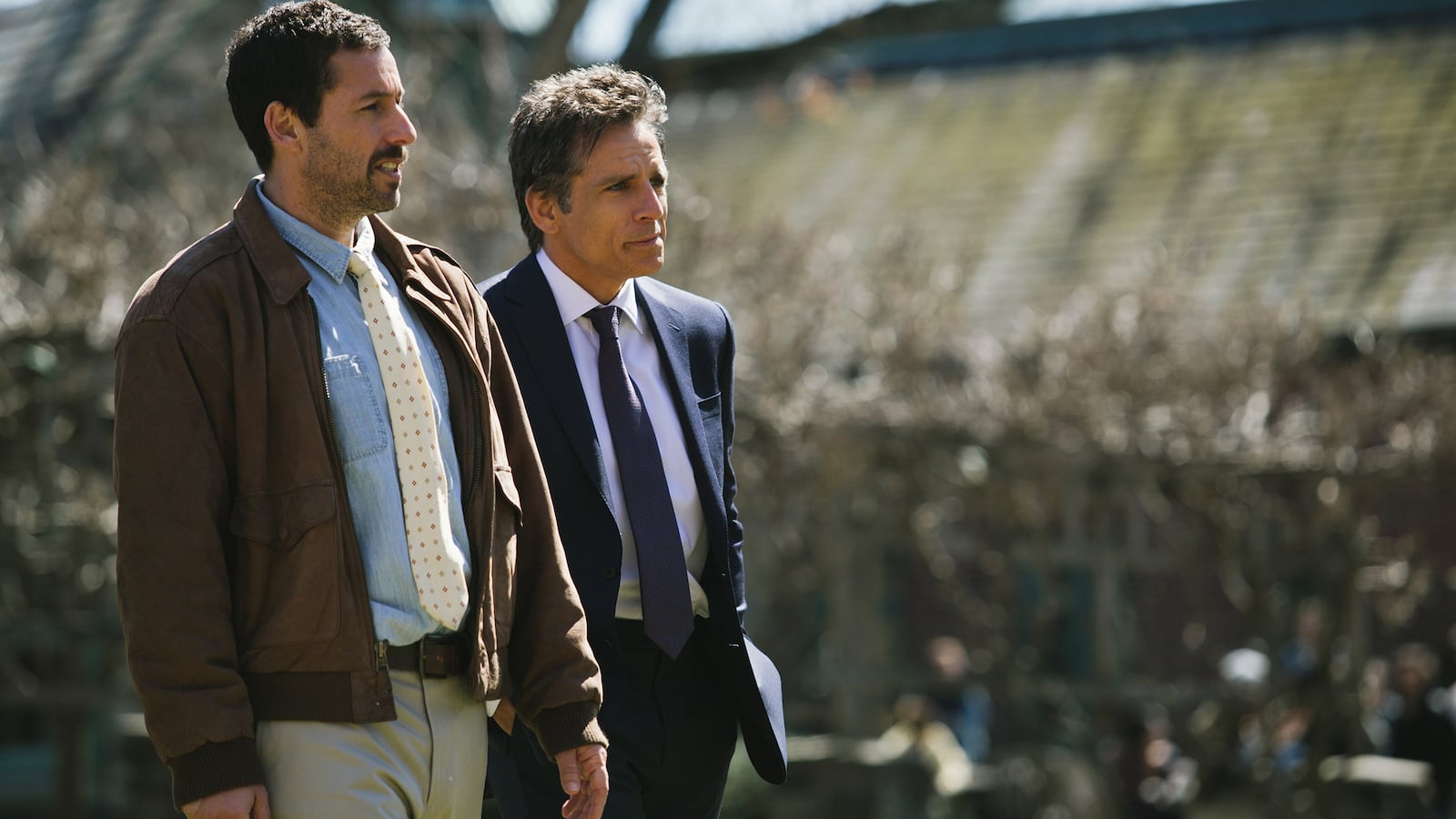Over the years, Adam Sandler’s place in the pop culture spectrum has gone through a precipitous series of ups and downs. Billy Madison, Happy Gilmore, and The Wedding Singer are considered classics—and the status of Punch-Drunk Love is indisputable—but whatever goodwill those movies earned was largely squandered by others like Jack and Jill, Pixels, and The Ridiculous Six. There’s some good news, though: It looks like the Sandler renaissance may be on the horizon. To start, while last year’s Sandy Wexler wasn’t exactly a hit, the critical response wasn’t as eviscerating as expected. And at the risk of hyperbole, his performance in this year’s The Meyerowitz Stories can’t be described as anything short of a miracle. (Disclaimer: The Meyerowitz Stories was released in partnership with IAC Films, which is owned by The Daily Beast's parent company.)
Sandler plays Danny Meyerowitz, the eldest son of Harold Meyerowitz (Dustin Hoffman), the patriarch around whom the rest of the film revolves. Harold’s children, Danny, Jean (Elizabeth Marvel, absolutely wonderful despite the fact that her role—both in the context of the family and in the context of the movie—is mostly on the sidelines), and Matt (Ben Stiller), are satellites, each trying not to get too sucked into his orbit but simultaneously trying not to be flung out into empty space as they contend with Maureen (Emma Thompson), Harold’s current—fourth—wife, and their respective families. When Harold lands in the hospital, the family struggles with everything that’s been left unaddressed and unresolved over the years. As the Meyerowitz children are told of their father’s failing health, they’re also given a suggested list of things to say to him before their time’s up. In order, they are:
I love you. Forgive me. I forgive you. Thank you. Goodbye.
Taken altogether, these five phrases inform the entirety of Noah Baumbach’s The Meyerowitz Stories. They’re deceptively simple groupings of one, two, three words that express the kinds of sentiments it often takes years to be able to properly convey, especially when it comes to family. Unconditional love is never as unconditional as it’s supposed to be, and it’s even harder to process while trying to keep track of constantly changing hospital staff. A doctor goes on vacation, a nurse gets reassigned—all that shifting makes it difficult to keep believing that that nurse or this doctor is best for the job.
Danny is experiencing that uncertainty not just with regards to their father’s care, but with his father on the whole. He wants to believe the best of Harold—“I have to think he was a genius,” he says, “or else he was just a prick”—but it’s a difficult weight to carry on top of his father’s perpetually self-absorbed behavior and the unshakeable sense that he’s a disappointment. Danny was a musical prodigy, but quit playing both as a form of protest against Harold, a sculptor who had hopes for all of his children as artists, and to raise his daughter Eliza (Grace Van Patten), now bound for college. And yet, his former musical promise is all that his father can talk about—at least, when he’s not talking about his own artistic ambitions (and disparaging that of his peers, including Judd Hirsch as an old friend opening a retrospective at the MoMA, an honor that only exacerbates Harold’s ire) and his youngest son, Matt. Matt seems to be the apple of his eye, to the point that he eventually substitutes Matt for Danny in a memory of them as children.
That said, while Harold talks about Matt to anyone who’ll listen, he only talks about himself in Matt’s presence. Stiller is a Baumbach regular—not to mention a second comedy giant in a movie that has as much anger and grief in it as humor—and is perfectly brittle, trying to hold his fraying home life together as decades’ worth of not feeling good enough start to bubble up to the surface. The argument between Matt and Harold that leads into the second half of the movie should feel familiar to anyone who’s ever endured parental pinprick after pinprick for the sake of avoiding conflict before finally exploding into something that’s that much worse for all the time that’s passed.
But The Meyerowitz Stories is ultimately Sandler’s movie. In the end, the five phrases that are given to the Meyerowitz children are inextricable from each other: love, forgiveness, gratitude, and farewells are tied together in the same way that families are, and in a sort of mirroring act, despite the way Baumbach introduces different themes through different characters, it’s Sandler who ties it all together. He’s the link between Meyerowitzes old and new as he contends with his father as well as his own attempts at being a father, balancing what he’s obligated to do as a son while trying to take care of himself, too. Like his father—and like his siblings—he has trouble distinguishing what pain is worth swallowing, and what pain has to be addressed; the limp that worsens as the movie goes on is proof of that, as is how he continually gravitates back to the piano despite having given it up in an attempt to buck his father’s influence. His attitude fluctuates in accordance, as Sandler veers between easy cheer and vicious flare-ups that prove to be enthusiasm just as often as they are frustration. There’s no gimmick to his performance here, no wink at the audience: He’s good. It’s the same raw, emotional quality that made Punch-Drunk Love so compelling—it’s just that this love story is a familial one.






